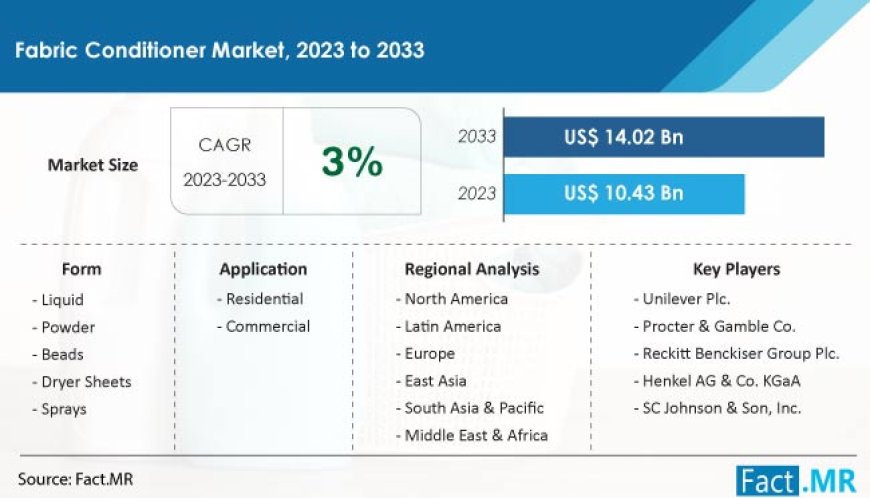Fabric Conditioner Market Demand is Projected to Rise at a CAGR of 3% from 2023 to 2033

As per Fact.MR, a provider of market research and competitive intelligence, the global fabric conditioner market is predicted to expand at a CAGR of 3% to reach a value of US $14.02 Bn by late 2033.
Fabric conditioners, also known as fabric softeners, are products used in laundry care to make clothes feel softer and smoother. They reduce static cling, making clothes more comfortable to wear, and can make ironing easier. Fabric conditioners also leave a pleasant fragrance on clothes and can extend the lifespan of fabrics by reducing wear and tear. They come in eco-friendly options and are compatible with various types of fabrics.
Get Free Sample Copy of This Report:
https://www.factmr.com/connectus/sample?flag=S&rep_id=3489
The expansion of the fabric conditioner industry is primarily driven by increasing consumer preference for soft and fragrant clothing, contributing to enhanced comfort and overall well-being. Additionally, the rising trend of high-efficiency washing machines, which work best with fabric conditioners, fuels market expansion.
Key Takeaways:
- In the US, demand for fabric conditioners market is growing at a rapid pace due to the fast-paced lifestyle of consumers and the rise in the adoption of eco-friendly fabric conditioners.
- Germany is expected to be the lucrative market across the globe due to high laundry standards boosting demand for specialized fabric conditioners.
- As per the end-use sector, fabric conditioners are substantially used the most in residential settings. Regular use of comfort and soft fabric conditioners is being witnessed in residential settings.
Key Companies Profiled in This Report Unilever Plc., Procter & Gamble Company, Reckitt Benckiser Group plc., Henkel AG & Co. KGaA, SC Johnson & Son, Inc., The Clorox Company, Godrej Consumer Products Limited, Norfil Inc., Church & Dwight Co., Lion Corporation., Dropps, Kao Corporation., LG Household & Healthcare Ltd., Marico, The Clorox Company., Seventh Generation Inc., Ecover, Melaleuca Inc., Werner & Mertz
Get Customization on this Report for Specific Research Solutions:
https://www.factmr.com/connectus/sample?flag=RC&rep_id=3489
Market Segmentations
By Form : Liquid, Powder, Beads, Dryer Sheets, Sprays
By Nature : Organic, Conventional, By Application :, Residential, Commercial
By Sales Channel : Modern Trade, Independent Retailers, Direct Sales, Departmental Stores, Convenience Stores, Online Retail Channels, Drug Stores and Pharmacies
By Region : North America, Latin America, Europe, Asia Pacific, Middle East & Africa
Market Competition
Prominent market participants are implementing diverse marketing approaches to expand their market presence and revenue. They are dedicating resources to research and development endeavors aimed at introducing enhanced fabric conditioner varieties. Prominent players in the market are Unilever PLC, Procter & Gamble Company, and Henkel AG & Co.
- In September 2022, Lenor, a brand under Proctor and Gamble, launched three fresh fabric conditioners designed for outdoor use. Additionally, the company unveiled its pioneering Solar Dry technology, showcasing its dedication to inventive solutions aimed at drawing a broader audience to the ‘outdoorable’ product range.
- In August 2021, Unilever launched the new Comfort’s Ultimate Care fabric conditioners, claiming they extend the lifespan of clothes while minimizing environmental impact.
Winning strategies
- Developing distinct and pleasing scents in fabric conditioners is a smart strategy in the market. It helps products stand out, appeals to various consumer preferences, and creates a strong emotional connection. A good scent enhances the user experience, making clothes feel clean and fresh.
- Leading companies should offer products specially designed for people with sensitive skin or allergies. This caters to a specific group of consumers who require gentle formulas. These specialized conditioners should be free from common irritants like fragrances and dyes.
- Offering highly concentrated fabric conditioners is a smart move in the market. These strong formulas appeal to consumers looking for efficiency, reduced waste, and cost savings. They use less packaging and less product per use, which is better for the environment and more convenient for consumers.

 swatichaudhari
swatichaudhari 










